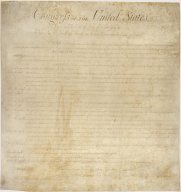On This Day in History
December 15, 1791
United States ratifies the Bill of Rights
 Bill of Rights
Bill of RightsOn this day in history, December 15, 1791, the United States ratifies the Bill of Rights. On December 15, 1791, Virginia became the 10th of 14 states to vote to ratify the first ten amendments to the Constitution. 14 states? Yes, Vermont had already come in as the 14th state on March 4 of the same year.
When the new US Constitution was being debated, many people refused to ratify it because they thought it did not give enough protection to individual rights. Proponents of the Constitution agreed to add a bill of rights in the first Congress if the opponents would agree to support it. This argument persuaded enough opponents to see the new Constitution ratified.
In the first Congress, James Madison proposed twenty amendments to the Constitution, the most popular from a long list of amendments proposed by the states. According to the Constitution's directions for the amendment process, Congress debated them and recommended twelve of them to the states. Each state then had its own internal debate and ten of them were eventually ratified, becoming the Bill of Rights.
The Bill of Rights contains a list of restrictions on the federal government and guarantees various rights to the people and the states. The Bill of Rights guarantees freedom of speech, freedom of religion, freedom of the press, freedom of assembly, the right to keep and bear arms and freedom from unreasonable searches and seizures of private property.
The Bill of Rights also guarantees that the government cannot house soldiers on private property except in case of war, the right to have a grand jury review infamous criminal charges, the right to trial by jury, the right not to incriminate oneself in court and the right to be tried in the district where criminal charges are alleged.
The Bill of Rights also guarantees that a criminal defendant must be informed of the charges against him, be able to obtain witnesses in his favor and be able to confront the witnesses against him. It also guarantees the right to have an attorney represent you in court, bans excessive bail, fines and cruel and unusual punishments. Finally, the Bill of Rights states the federal government only has the powers specifically given to it in the Constitution and reserves every other power and right to the states and individuals in them.
Read what happened on other days in American history at our On This Day in History section here.
Read more about the history of the Bill of Rights here.
For a brief synopsis of the First Ten Amendments
Learn about the Purpose of the Bill of Rights here.
Read about the History of the Bill of Rights here.
This Week in History
- December 15, 1791 - United States ratifies the Bill of Rights
- December 16, 1773 - Boston Tea Party takes place
- December 17, 1777 - French government formally recognizes the United States
- December 18, 1787 - New Jersey is the third state to ratify the US Constitution
- December 19, 1777 - Continental Army begins its encampment at Valley Forge
- December 20, 1776 - New Jersey militiamen skirmish with British Patrol at Howell's Ferry
- December 21, 1776 - Skirmish at Petticoat Bridge draws away support from Trenton
Like This Page?
© 2008 - 2022 Revolutionary-War-and-Beyond.com Dan & Jax Bubis










Facebook Comments